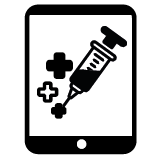Challenges
The World Health Organization (WHO) defines digital health as “the field of knowledge and practice associated with the development and use of digital technologies to improve health”. These days, a range of digital interventions and systems are available to address health challenges such as low service utilization, issues with the supply of medicines and commodities, health providers’ poor adherence to guidelines, and the lack of quality and reliable data.
 © AndreyPopov | istockphoto
Depending on the issue identified, there is a multitude of potential digital interventions for every building block of the healthcare system that can be leveraged to improve the health situation in a country – from very simple to very sophisticated in terms of the technology involved. Examples include treatment reminders to patients via SMS, telemedicine for remote consultations, or devices to support the diagnosis and decision-making of healthcare practitioners. Also, technology for cold-chain supervision, digital reporting of indicators for informed decision making, digital disease surveillance, and many other use cases are available.
© AndreyPopov | istockphoto
Depending on the issue identified, there is a multitude of potential digital interventions for every building block of the healthcare system that can be leveraged to improve the health situation in a country – from very simple to very sophisticated in terms of the technology involved. Examples include treatment reminders to patients via SMS, telemedicine for remote consultations, or devices to support the diagnosis and decision-making of healthcare practitioners. Also, technology for cold-chain supervision, digital reporting of indicators for informed decision making, digital disease surveillance, and many other use cases are available.
Although challenges such as ensuring data security, privacy and reliability, digital infrastructure gaps, or the lack of clear data interoperability standards still pose severe obstacles, digital health solutions have the potential of truly transforming health systems around the world.
GFA concept and services
GFA’s concept for implementing digital health solutions is in line with the globally agreed Principles for DigitalDevelopment which define the necessary steps for safeguarding the sustainability of digital solutions.
Experts provide technical assistance to governments and organizations across the range of health system challenges, from assessments and evaluations to large-scale interventions such as digitizing the national management of blood services in Ukraine. Digital solutions also allow GFA to expand outreach to the population, particularly to those living in remote communities and to other priority and hard-to-reach groups. This enhances the latter’s engagement in health programs and their access to health education and health services.
If suitable to enhance the efficiency of health systems and the quality of health services, GFA consultant teams proactively integrate digital health tools into the respective technical assistance portfolio.
Photo on top: NanoStockk | istockphoto
Contact
 Eva Schildbach
Eva Schildbach
Director Health Department
E-mail: eva.schildbach[at]gfa-group.de






